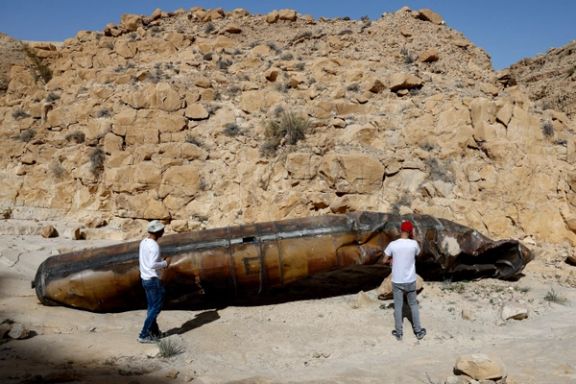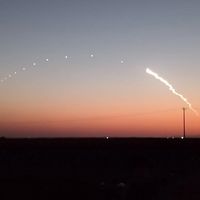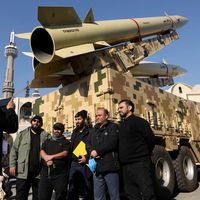As analysts work to interpret Israel's decisions and the growing challenges it faces, President Joe Biden and some Western allies have criticized Prime Minister Benjamin Netanyahu’s hardline approach toward Iran's proxies. They describe this stance as "unhelpful," attributing part of the ongoing attacks from Iran and its allies, which have intensified since October 2023, to Israel's own actions.
Nearly a year since Hamas’s attack on October 7, 2023, it is ever more apparent that even those in the highest seats of power require a sobering reminder of the events that have plunged the Middle East into chaos. Let there be no ambiguity: circumstantial evidence and irrefutable facts make plain that any perceived obstinacy on Prime Minister Netanyahu’s part in the drawn-out ceasefire talks is a necessary answer to crises not of Israel’s making. These dire circumstances have been thrust upon Israel, the Palestinians, the Lebanese, and the Iranians alike by the malevolent machinations of Iran’s mullahs and their armed henchmen. It is they who have brewed this bitter draught, imperiling the peace of the Middle East—and indeed, the world.
The road to escalation
The present crisis was unleashed in the early hours after Hamas's brutal assault upon southern Israel on October 7, 2023. As Israel moved swiftly to repel and extinguish the invaders in the south, Hezbollah—Iran’s foremost armed proxy in the region and Israel’s northern neighbor—opened a barrage of projectiles on October 8 upon northern Israel, forcing the nation into a multi-front struggle against Iran’s sprawling web of armed proxies. By the dawn of 2024, the flames of conflict, fanned by these proxies, had set the entire region ablaze.
Over the past year, and most markedly since February 2024, the Biden administration has sought to fortify its military might in the region, deploying a formidable fleet—several aircraft carriers, an attack nuclear submarine, and a host of air squadrons—all with the declared purpose of deterrence. Yet, whilst thus brandishing its strength, it has exerted ever-mounting pressure upon Israel to curtail its operations in Gaza and assume a more flexible stance in ceasefire talks with Hamas. Accompanying these efforts has been a tireless shuttle diplomacy led by the administration’s foremost emissaries—Secretary of State Anthony Blinken, CIA Chief William Burns, National Security Advisor Jake Sullivan, and, as of March 2024, Special Envoy for Lebanon Amos Hochstein. However, this flurry of diplomatic ventures has, thus far, yielded but scant fruit and remains barren of tangible success.
In the spring of 2024, the IRGC and Hezbollah, hand in glove, fortified their forces and missile sites along Israel’s northern frontier, with the express aim of forcing Israel's hand in the faltering ceasefire talks with Hamas. To secure full coordination and devise new schemes—including the rumored audacious incursion into northern Israel, mirroring Hamas’s brazen October 7 assault on the south—Tehran dispatched several of its IRGC high command, led by General Zahedi, to Damascus.
On April 1, in a bold pre-emptive strike, Israel eliminated General Zahedi and his lieutenants within the very walls of the Iranian embassy compound in Damascus—an act swiftly condemned by some as a breach of international law but vindicated by the exposure of Iran's exploitation of diplomatic immunity, flouting the 1961 Vienna Convention on Diplomatic Relations.
Iran’s reprisal came on April 13, unleashing a slow-motion barrage of hundreds of projectiles upon Israel. Six days later, on April 19, Israel struck back, dismantling a critical anti-aircraft radar system within an airbase deep in the Iranian heartland. This was merely the prelude to what followed. On July 31, Israel struck down Hamas’s political chief, Ismael Haniyeh, in Tehran—a blow that disgraced Iran's intelligence and marred President Masoud Pezeshkian's inauguration. And on September 27, Israel eliminated Hezbollah’s Secretary General, Hassan Nasrallah, in Beirut, marking a decisive shift in the balance of power.
On the very day that Iran unleashed nearly 200 projectiles upon Israel on October 1, 2024, Israel commenced its limited ground incursions against Hezbollah in southern Lebanon. At this moment, not just the region, but the entire West, stands confronted with a stark and ominous reality: A nuclear threshold state—Iran—has openly demonstrated its resolve to strike at Israel, for a second time, employing ballistic missiles that stands but a few short strides away from being armed with nuclear warheads. Furthermore, Iran’s formidable proxy, Hezbollah, however hitherto somewhat decapitated, bruised, battered, and on its backheels, holds an arsenal of tens of thousands of rockets and precision-guided missiles, poised and ready to be hurled upon Israel at any given moment.
Dilemmas and options
Those who strive to prevent a region-wide conflict would be wise to confront the stark realities of the Middle East as they truly are. It is not simply a matter of averting a conflict that looms on the horizon—for that conflict is already upon us. Rather, their task is to prevent the entire region from spiraling into total war—a total war overshadowed by the specter of nuclear proliferation, driven by a Shia fundamentalist theocracy whose professed aim for the past 45 years has been the destruction of the State of Israel, and whose leaders have openly threatened to accelerate their march towards nuclear armament as of May 8, 2024.
Indeed, as the world held its breath, anticipating Iran’s reprisal for the elimination of General Zahedi by Israel, the author of this very piece observed on April 10, 2024, that Iran might hasten its march toward nuclear armament, seeking to wield such weapons as a deterrent against Israel and the United States. Israel has sounded the alarm to the world since at least 2004, but those warnings have all too often fallen upon deaf ears.
In this grave hour, it is certain that the majority of Israelis stand as one, ready to support their government should it act to vanquish any threat to the very existence of the Jewish State. Of all perils upon the horizon, none is more immediate than the specter of Iran's nuclear program. Its destruction—whether partial or total—is not merely a strategic aim but a matter of survival. Equally vital is the crippling of Iran’s military-industrial capabilities. Let there be no delusion: Iran has become a purveyor of military drones, missiles, and munitions, threatening the peace and stability of the Trans-Atlantic world, and proving itself a menace not just to the region but to the global order.
Israel faces the delicate task of navigating the goodwill of Iran and Lebanon, nations it may need to strike. Yet, solace lies in the deep bitterness harbored by millions of Iranians and Lebanese against the Shia clerics and their armed minions, who have brought years of turmoil and economic ruin. The recent deployment of anti-riot forces across Iran—to quash any celebration after Hassan Nasrallah’s elimination—reveals the depths to which the regime has fallen in the eyes of Iranians, who valiantly rose in 2022 to cast off the mullahs, though in vain. A similar sense of relief resounds in Lebanon, Nasrallah's own land, exposing the growing chasm between the people and their so-called protectors.
Netanyahu, keenly attuned to this discontent, directly addressed the Iranian and Lebanese peoples, urging them to rise and shatter the chains imposed by Hezbollah and the Islamic Republic of Iran—appeals that resonated deeply. Thus, Israel would be wise to wield its might with utmost precision, striking at the military-industrial sinews of both the Iranian regime and Hezbollah. If Israel chooses to target Iran’s petrochemical plants—lifeblood of revenue for the ruling echelon and the IRGC—and their refineries, it would deliver a grievous blow to a regime already struggling to provide petrol to its own citizens, despite its status as an oil-exporter. Such a crippling of economic power would shake the very foundations upon which the regime's dominion rests.
On a final, yet vital note of protocol, Israel has, throughout its history, scrupulously refrained from the assassination of heads of state or government, even amidst its most formidable foes. As the fog of war clouds the judgment of many, any such speculation that Israel intends to strike down Ali Khamenei verily appears as naught but a far-fetched fancy.
The fallout
Israel must brace itself to weather condemnation from both friend and foe, should it unleash devastating blows upon the Islamic Republic of Iran and Hezbollah in the coming days and weeks. Such rebuke, though it may ring loud and strident, shall, in all probability, dissipate into the ether, drowned by the manifold crises with which humanity now grapples. From a contested US presidential election to the grim intensification of the Russo-Ukrainian War, and any unforeseen calamities that may yet darken our shared destiny, these cries of censure shall become mere whispers, lost to the winds of time.
In the final reckoning, Israel’s strikes may prove fatal to Hezbollah, dismantling it as a paramilitary behemoth—a state within the Lebanese state—and reducing it to a mere political faction. The twin blows of military decimation and economic ruin upon Iran’s economic and nuclear infrastructure may well mark the beginning of the end for a regime that has held sway over Iran for nearly half a century. Yet, let none forget that such regimes seldom relinquish power without a sanguinary struggle, as they stare into the abyss of their own collapse.
Opinions expressed by the author are not necessarily the views of Iran International









